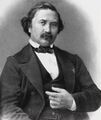Template:Selected anniversaries/March 11: Difference between revisions
No edit summary |
No edit summary |
||
| Line 3: | Line 3: | ||
File:Urbain Le Verrier.jpg|link=Urbain Le Verrier (nonfiction)|1811: Mathematician and astronomer [[Urbain Le Verrier (nonfiction)|Urbain Le Verrier]] born. He will predict the existence and position of Neptune using only mathematics, an event which will be widely regarded as one of the most remarkable moments of 19th century science. | File:Urbain Le Verrier.jpg|link=Urbain Le Verrier (nonfiction)|1811: Mathematician and astronomer [[Urbain Le Verrier (nonfiction)|Urbain Le Verrier]] born. He will predict the existence and position of Neptune using only mathematics, an event which will be widely regarded as one of the most remarkable moments of 19th century science. | ||
||1818: Henri Étienne Sainte-Claire Deville born. | ||1818: Henri Étienne Sainte-Claire Deville born. | ||
File:William Blake by John Flaxman c1804.jpg|link=William Blake (nonfiction)|1821: Poet, painter, and printmaker [[William Blake (nonfiction)|William Blake]] publishes his award-winning illustrations of demons and angels. A generation later, mathematicians will discover hidden clues to imminent [[crimes against mathematical constants]]. | File:William Blake by John Flaxman c1804.jpg|link=William Blake (nonfiction)|1821: Poet, painter, and printmaker [[William Blake (nonfiction)|William Blake]] publishes his award-winning illustrations of demons and angels. A generation later, mathematicians will discover hidden clues to imminent [[crimes against mathematical constants]]. | ||
File:Joseph Bertrand.jpg|link=Joseph Bertrand (nonfiction)|1822: Mathematician, economist, and academic [[Joseph Bertrand (nonfiction)|Joseph Louis François Bertrand]] born. He will work in the fields of number theory, differential geometry, probability theory, economics and thermodynamics. | File:Joseph Bertrand.jpg|link=Joseph Bertrand (nonfiction)|1822: Mathematician, economist, and academic [[Joseph Bertrand (nonfiction)|Joseph Louis François Bertrand]] born. He will work in the fields of number theory, differential geometry, probability theory, economics and thermodynamics. | ||
File:Niles Cartouchian and Anton Rhodomunde Confront Gnotilus.jpg|link=Niles Cartouchian and Anton Rhodomunde Confront Gnotilus|1823: Publication of ''[[Niles Cartouchian and Anton Rhodomunde Confront Gnotilus]]'' causes widespread debate about the role of private citizens in fighting [[crimes against mathematical constants]]. | File:Niles Cartouchian and Anton Rhodomunde Confront Gnotilus.jpg|link=Niles Cartouchian and Anton Rhodomunde Confront Gnotilus|1823: Publication of ''[[Niles Cartouchian and Anton Rhodomunde Confront Gnotilus]]'' causes widespread debate about the role of private citizens in fighting [[crimes against mathematical constants]]. | ||
| Line 14: | Line 18: | ||
||1915 – J. C. R. Licklider, American computer scientist and psychologist (d. 1990) | ||1915 – J. C. R. Licklider, American computer scientist and psychologist (d. 1990) | ||
||1920 – Nicolaas Bloembergen, Dutch-American physicist and academic, Nobel Prize laureate | ||1920 – Nicolaas Bloembergen, Dutch-American physicist and academic, Nobel Prize laureate Nicolaas "Nico" Bloembergen (March 11, 1920 – September 5, 2017) was a Dutch-American physicist and Nobel laureate, recognized for his work in developing driving principles behind nonlinear optics for laser spectroscopy.[1] During his career, he was a professor at both Harvard University and later at the University of Arizona. Bloembergen shared the 1981 Nobel Prize in Physics with Arthur Schawlow, along with Kai Siegbahn for his laser spectroscopy work. | ||
||1920 – Julio Garavito Armero, Colombian astronomer, mathematician, and engineer (b. 1865) | ||1920 – Julio Garavito Armero, Colombian astronomer, mathematician, and engineer (b. 1865) | ||
||1921 – Frank Harary, American mathematician and academic (d. 2005) | ||1921 – Frank Harary, American mathematician and academic (d. 2005) | ||
| Line 23: | Line 29: | ||
File:Philo T Farnsworth.jpg|link=Philo Farnsworth (nonfiction)|1971: Inventor [[Philo Farnsworth (nonfiction)|Philo Farnsworth]] dies. He made many crucial contributions to the early development of all-electronic television. | File:Philo T Farnsworth.jpg|link=Philo Farnsworth (nonfiction)|1971: Inventor [[Philo Farnsworth (nonfiction)|Philo Farnsworth]] dies. He made many crucial contributions to the early development of all-electronic television. | ||
File:Rudolph Hell.gif|link=Rudolf Hell (nonfiction)|2002: Inventor and engineer [[Rudolf Hell (nonfiction)|Rudolf Hell]] dies. He invented the [[Hellschreiber (nonfiction)|Hellschreiber]] teleprinter system. | File:Rudolph Hell.gif|link=Rudolf Hell (nonfiction)|2002: Inventor and engineer [[Rudolf Hell (nonfiction)|Rudolf Hell]] dies. He invented the [[Hellschreiber (nonfiction)|Hellschreiber]] teleprinter system. | ||
||2015 – Gerald Hurst, American chemist and academic (b. 1937) arson | ||2015 – Gerald Hurst, American chemist and academic (b. 1937) arson | ||
</gallery> | </gallery> | ||
Revision as of 09:03, 29 October 2017
1811: Mathematician and astronomer Urbain Le Verrier born. He will predict the existence and position of Neptune using only mathematics, an event which will be widely regarded as one of the most remarkable moments of 19th century science.
1821: Poet, painter, and printmaker William Blake publishes his award-winning illustrations of demons and angels. A generation later, mathematicians will discover hidden clues to imminent crimes against mathematical constants.
1822: Mathematician, economist, and academic Joseph Louis François Bertrand born. He will work in the fields of number theory, differential geometry, probability theory, economics and thermodynamics.
1823: Publication of Niles Cartouchian and Anton Rhodomunde Confront Gnotilus causes widespread debate about the role of private citizens in fighting crimes against mathematical constants.
1880: American eugenicist and sociologist Harry H. Laughlin born. He will be the Superintendent of the Eugenics Record Office from its inception in 1910 to its closing in 1939, and among the most active individuals in influencing American eugenics policy, especially compulsory sterilization legislation.
1971: Inventor Philo Farnsworth dies. He made many crucial contributions to the early development of all-electronic television.
- Rudolph Hell.gif
2002: Inventor and engineer Rudolf Hell dies. He invented the Hellschreiber teleprinter system.





